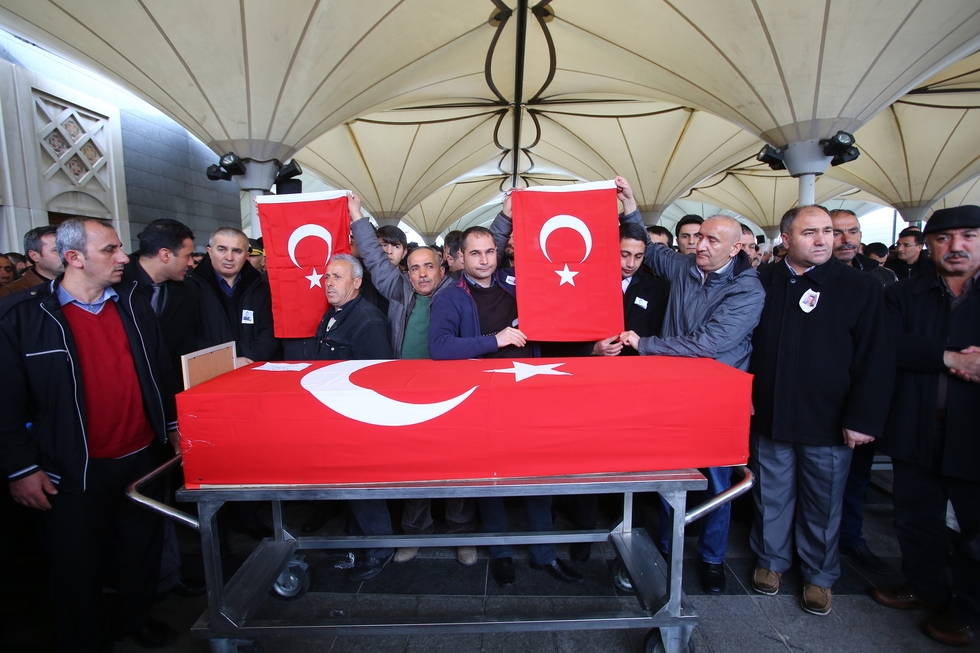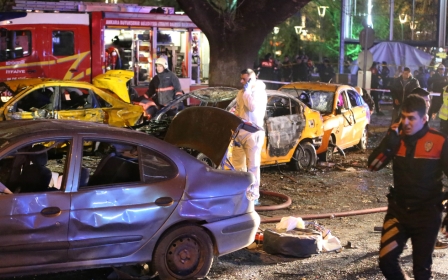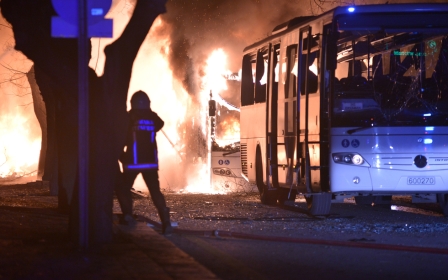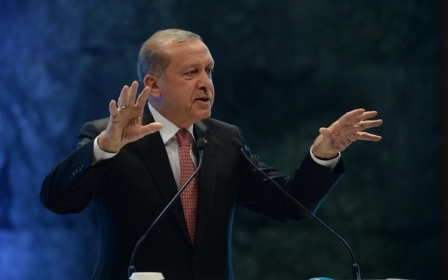Turkey arrests eleven in hunt for Ankara bombers

Turkish security forces have arrested 11 people amid claims a Kurdish suicide bomber was linked to an Ankara car bomb attack that killed at least 37 people.
According to the state-run Anadolu news agency, police acted on a tip-off on Monday that the car used in the previous day's bombing had been bought from a dealership in Sanliurfa.
The agency said four suspects has been arrested near the Syrian border and were due to be taken to Ankara for questioning.
Prime Minister Ahmet Davutoglu added on Monday that a further seven suspects had been arrested.
The arrests came hours after an anonymous Turkish official told the AFP news agency that a female member of the Kurdish PKK movement was involved in the suicide attack, although the report did not offer evidence.
The attack was the third major bombing since November in the Turkish capital, which has remained on high alert. No group or individual has claimed the attack.
"There are very serious, almost certain, findings that point to the separatist terrorist organisation," Davutoglu told reporters after visiting the wounded at an Ankara hospital.
Tensions, both political and ethnic, have increased since the collapse of a ceasefire between the PKK and the Turkish state last July.
On Monday, the offices of the pro-Kurdish Peoples Democracy Party (HDP) in the northwestern city of Edirne came under attack, reportedly by armed gunmen, according to Anadolu.
Turkish nationalists and government officials have often accused the HDP of being the political wing of the PKK, though the party has denied this.
Relatives of the Ankara bombing victims criticised the government's handling of the attack, suggesting they had failed to keep the population safe.
"People have been talking about another bomb attack coming for more than a week but the government took no precautions and didn't warn anyone," Nihat Gorgulu, the uncle of one of the victims, told AFP.
"We are very afraid because the government doesn't care about the people of this country."
Many have pointed to a statement released by the American embassy on Friday which suggested that they expected an attack in the capital, though the warning referred to a different area from the one attacked.
The pro-Kurdish People's Democracy Party (HDP) released a statement on Sunday evening condemning the attack for targeting "our fellow civilian citizens":
However, HDP leader Selahattin Demirtas on Monday criticised the Turkish government's response to the attack.
"Isn't the government politically liable?" he said. "They say we cannot remark in such cases! What should we do? Thank them? Compliment them?"
The PKK has in the past disavowed attacks on civilians. Following a car bomb attack in the southeast town of Cinar in January that killed two civilians, the group released a statement apologising for the deaths.
“It is clear that civilians should never be our target in accordance with the general line and political objectives of our movement. The target of this action was the security forces,” the PKK said in a statement released by the pro-Kurdish Firat News Agency (ANF).
However, TAK have been seen as having less scruples where civilian deaths are confirmed and have previously deemed the PKK "too humanist" with regards to its operations.
On Sunday, Erdogan said Turkey would continue to fight terrorism determinedly and would assert its right of self-defence to prevent further attacks.
"Our people should not worry, the struggle against terrorism will for certain end in success and terrorism will be brought to its knees," Erdogan said.
Turkey launched airstrikes against PKK targets in northern Iraq following the Ankara bombing.
The war between the PKK and the Turkish state has been going on since 1984 and has so far claimed over 40,000 lives.
Some analysts have suggested that the ongoing conflict in the southeast - which has seen thousands of deaths since last July, according to the Turkish government - has backfired on the PKK.
"The 'uprising' launched by the PKK has not worked. Even the Kurdish population has distanced itself from its operations in the southeastern towns," Can Acun, an analyst with Turkish thinktank SETA, told AFP.
"In frustration the PKK seems to have chosen to go for more serious acts."
New MEE newsletter: Jerusalem Dispatch
Sign up to get the latest insights and analysis on Israel-Palestine, alongside Turkey Unpacked and other MEE newsletters
Middle East Eye delivers independent and unrivalled coverage and analysis of the Middle East, North Africa and beyond. To learn more about republishing this content and the associated fees, please fill out this form. More about MEE can be found here.




